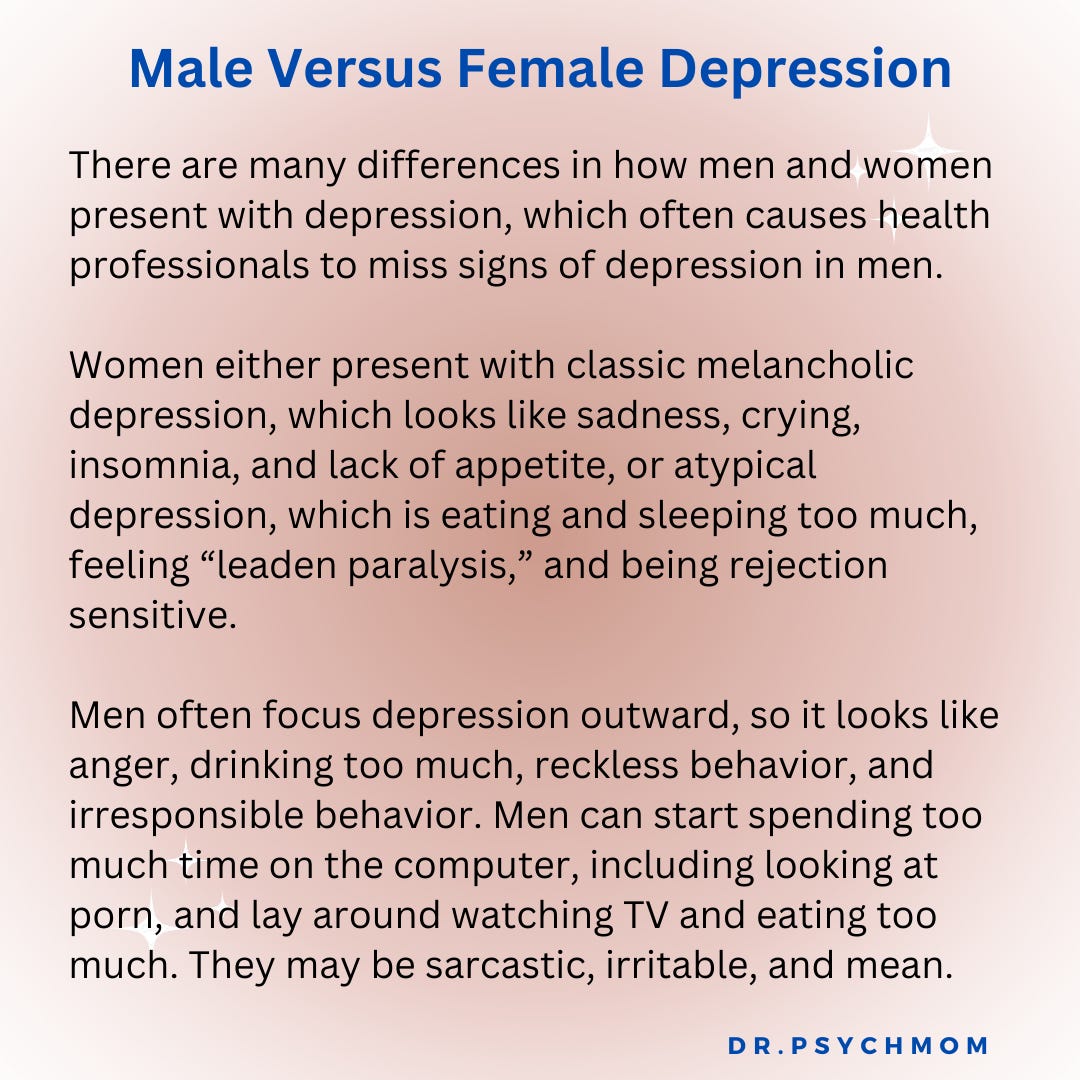Male Versus Female Depression
depression doesn't manifest the same way in men and women! learn how it differs so you can recognize it for what it is.
There are many differences in how men and women present with depression, which often causes health professionals to miss signs of depression in men. Women either present with classic melancholic depression, which looks like sadness, crying, insomnia, and lack of appetite, or atypical depression, which is eating and sleeping too much, feeling “leaden paralysis,” and being rejection sensitive. Women are twice as likely to experience depression as males, but rates in men are not negligible. In fact, over 6 million males in America alone are depressed.
In contrast to women’s more obvious displays of depression, men often focus depression outward, so it looks like anger, drinking too much, reckless behavior, and irresponsible behavior (like going in late to work). Men can start spending too much time on the computer, including looking at porn, and lay around watching TV and eating too much. They may be sarcastic, irritable, and mean. Loved ones often feel hurt and confused by their behavior, and withdraw emotionally to avoid being snapped at. This leaves depressed men even more isolated and upset. (Some depressed women can also present as angry or irritable, particularly in atypical depression. They too are at risk of loved ones withdrawing just at the moment when they are needed most.)
Males are much less likely than women to verbalize their feelings and say they feel sad or hopeless. Since males are taught not to be vulnerable, they often shy away from expressions of sadness and turn them into anger, and take internal feelings of inadequacy and turn them into rage at others. While a depressed woman may say, “I feel like I’m a bad mother,” a depressed dad struggling with the same issue would say, “These kids are being terrible.” (Read my post about male post-partum depression here). In terms of suicidality, women attempt suicide more, but men complete suicides more frequently.
Causes of depression in men can vary; there are obviously not menstrual cycle issues with men, whereas many women have premenstrual dysphoric disorder (PMDD), and depression exacerbated by menstruating or giving birth. Men can, however, have depression related to levels of low testosterone. In terms of environmental stressors, males become very depressed when losing a job, more so than women, likely because more of their identity is tied up in being a breadwinner. In my clinical experiences, males often become depressed when rejected by women, or when they are in loveless or sexless marriages. However, it can be hard to tell cause from effect, as depressed men will not present themselves in a manner that is attractive to women, and many wives are frustrated with depressed husbands, and withdraw emotionally and physically.
Men who are diagnosed with depression can be more resistant to using meds or going to therapy, again because they have been trained throughout their lives to feel that they should deal with issues themselves, and that it is weak to accept support. They feel they “should” be able to fix their depression themselves without popping a pill or talking to someone about their issues. When males can be taught that depression is a disease just like diabetes or cancer, they are more likely to be able to feel comfortable with medication management or talk therapy.
If you’re a male suffering from depression, there is no shame in reaching out for help. Do it for your family if not for yourself. And till we meet again, I remain, The Blogapist Who Says, Depression is Treatable, But You Have To Recognize It.
For therapy, go here for Dr. Whiten and go here for other clinicians in her group practice Best Life Behavioral Health. For coaching with Dr. Whiten, go here. Order Dr. Whiten’s books, Couples You Meet in Counseling: 7 Common Relationship Dynamics That Sabotage Closeness, 52 Emails to Transform Your Marriage and How to Talk to Your Kids about Your Divorce: Healthy, Effective Communication Techniques for Your Changing Family, and listen to The Dr. Psych Mom Show on Spotify, Apple Podcasts, or anywhere else you listen to podcasts. Join The Dr. Psych Mom secret Facebook group for more discussion about these kinds of issues!
This blog is not intended as medical advice or diagnosis and should in no way replace consultation with a medical professional. If you try this advice and it does not work for you, you cannot sue me. This is only my opinion, based on my background, training, and experience as a therapist and person. Also, all examples involving people or clients are hypothetical amalgams, not actual people.





